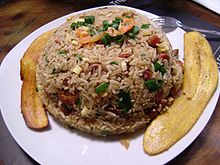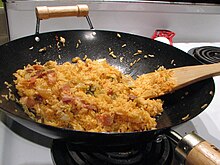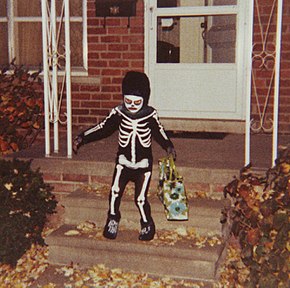HOMEMADE CHICKEN FRIED RICE
 |
| Chicken Fried Rice |
 |
| Chicken Fried Rice |
 |
| Chicken Fried Rice |
Fried Rice
Ingredients
¼ cup salad oil (Optional:
I used 2 tablespoons)
2 cups cold cooked white rice
3 eggs, beaten
2 cooked bacon
slices, crumbled
2 tablespoons soy sauce
⅛ teaspoon pepper
3 green onions
with tops, sliced
Optional: Cooked Chicken Breast cubed.
Optional: Cooked Peas
Method
1.
Heat
oil in heavy skillet. In hot oil, sauté
rice, over medium heat, stirring with metal spoon, about 5 minutes, or until
golden.
2.
Stir
eggs into rice; cook, stirring constantly and over medium heat, until eggs are
cooked about 3 minutes.
3.
Then
stir in bacon, soy sauce, and pepper; combine well. Garnish with green onions.
4.
Makes
6 Servings
Fried Rice was made and prepared by Shirley-Ann Pearman
Photography by Shirley-Ann
Pearman
For all photos on Fried
Rice, please click on the photos to this post here at Facebook.
Fried Rice
 | |
| Alternative names | |
|---|---|
| Type | Rice dish |
| Course | Main course |
| Place of origin | Various |
| Region or state | Worldwide |
| Main ingredients | Cooked rice, cooking oil |
| Variations | Bokkeum-bap Chāhan Chǎo fàn Khao phat Nasi goreng |
Fried Rice is a dish of cooked rice that has been stir-fried in a wok or a frying pan and is usually mixed with other ingredients such as eggs, vegetables, seafood, or meat. It is often eaten by itself or as an accompaniment to another dish. Fried rice is a popular component of East, Southeast and certain South Asian cuisines. As a homemade dish, fried rice is typically made with ingredients left over from other dishes, leading to countless variations. Being an economical hodgepodge, the same approach is often taken with fried noodles or pyttipanna[1] as well. Fried rice first developed during the Sui Dynasty in China and as such all fried rice dishes can trace their origins to Chinese fried rice.[2]
Many popular varieties of fried rice have their own specific list of ingredients. In Greater China, the most famous varieties include Yangzhou fried rice and Hokkien fried rice. Japanese chāhan is considered a Japanese Chinese dish, having derived from Chinese fried rice dishes. Korean bokkeum-bap in general is not, although there is a Korean Chinese variety of bokkeum-bap. In Southeast Asia, similarly constructed Indonesian, Malaysian, and Singaporean nasi goreng and Thai khao phat are popular dishes. In the West, most restaurants catering to vegetarians have invented their own varieties of fried rice, including egg fried rice. Fried rice is also seen on the menus of American restaurants offering cuisines with no native tradition of the dish. Additionally, there are variations of fried rice in Middle and South Americas. Some of these variations include Ecuadorian chaulafan, Peruvian arroz chaufa, Cuban arroz frito, and Puerto Rican arroz mamposteao.
Fried rice is a popular street food in Asia. In some Asian countries, small restaurants, street vendors and traveling hawkers specialize in serving fried rice. In Indonesian cities it is common to find fried rice street hawkers moving through the streets with their food cart and stationing it in busy streets or residential areas. Many Southeast Asian street food stands offer fried rice with a selection of optional garnishes and side dishes.




















